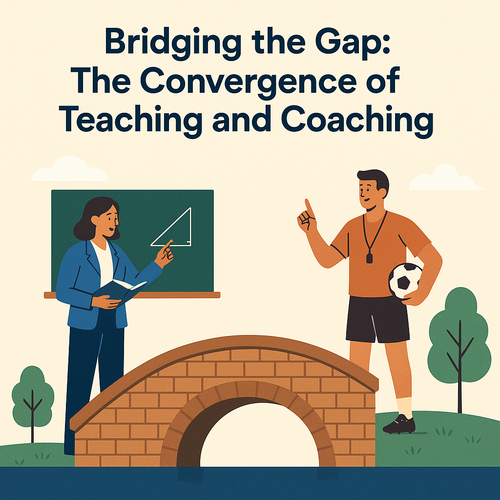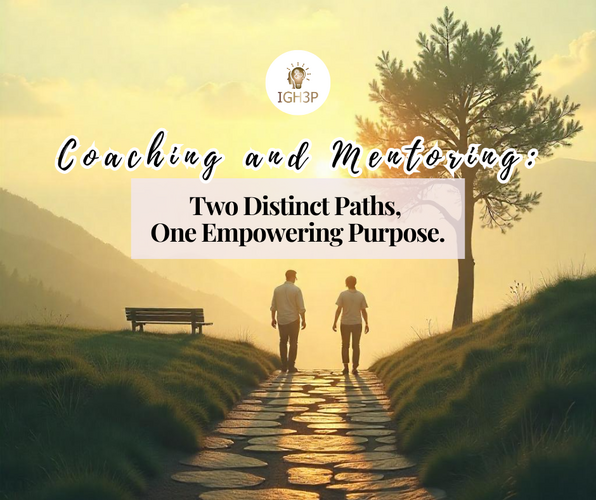Blog
coaching
The Power of Neuroplasticity in Coaching
Neurocoaching – Bridging the Gap Between Science and Personal Development
From Instruction to Inspiration: The Educator-Coach Model
Empowering Educators: The Benefits of Coaching Skills in Teaching
Bridging the Gap: The Convergence of Teaching and Coaching
Mentoring as a Vocation – Guiding with Experience and Purpose
Mentoring as a Vocation – Guiding with Experience and Purpose
Mentoring, at its best, is an act of generosity, leadership, and legacy. Unlike coaching, which centres on facilitating a client’s self-directed growth, mentoring draws upon the mentor’s lived experience to guide, advise, and inspire another person—typically someone earlier in their personal or professional journey. For many seasoned practitioners, mentoring becomes a natural extension of their career—a vocation that allows them to g…
A Career in Coaching – Challenges, Skills and Fulfilment
A Career in Coaching – Challenges, Skills and Fulfilment
Coaching has become one of the most dynamic and transformative fields in the helping professions. Increasingly integrated into business, education, health, and personal development contexts, coaching offers individuals the opportunity to create change, realise goals, and deepen self-awareness. For those considering a career in coaching, it is both a deeply fulfilling and intellectually demanding path. However, to thrive, one must understa…
Coaching and Mentoring – Distinct Paths to Empowerment
Coaching and Mentoring – Distinct Paths to Empowerment
In the fields of personal growth and professional development, coaching and mentoring play vital roles in supporting individuals to unlock their potential. Though the two practices are sometimes conflated, they are fundamentally different in structure, intention, and impact. Understanding these differences is essential not only for those seeking guidance but also for individuals considering a career in either field.
Coaching is typically a…
Bouncing Forward: Resilience as a Competitive Advantage in Coaching
The coaching landscape is becoming saturated.
What will differentiate you? In 2025 and beyond, it is not just your certificates or methodologies — it is your resilience.
Clients are increasingly sophisticated; they seek coaches who can hold space for complexity, uncertainty, and vulnerability. Coaches who have personally developed strong emotional and mental resilience will naturally inspire trust and credibility.
Building resilience means bouncing forward, not just back. It means integrating…
Emotional Fitness: The New Frontier for Coaches
In an era increasingly aware of mental health, the future belongs to coaches who invest deeply in emotional fitness — their own and their clients’.
Emotional resilience is not innate; it is a cultivated competency, much like physical fitness. Just as strength training builds muscles, emotional challenges strengthen psychological flexibility. Aspiring coaches must view difficult emotions — anger, fear, sadness — not as enemies to avoid, but as invitations to grow.
Techniques such as mindfulness…
Blog
coaching
The Power of Neuroplasticity in Coaching
Neurocoaching – Bridging the Gap Between Science and Personal Development
From Instruction to Inspiration: The Educator-Coach Model
Empowering Educators: The Benefits of Coaching Skills in Teaching
Bridging the Gap: The Convergence of Teaching and Coaching
Mentoring as a Vocation – Guiding with Experience and Purpose
Mentoring as a Vocation – Guiding with Experience and Purpose
Mentoring, at its best, is an act of generosity, leadership, and legacy. Unlike coaching, which centres on facilitating a client’s self-directed growth, mentoring draws upon the mentor’s lived experience to guide, advise, and inspire another person—typically someone earlier in their personal or professional journey. For many seasoned practitioners, mentoring becomes a natural extension of their career—a vocation that allows them to g…
A Career in Coaching – Challenges, Skills and Fulfilment
A Career in Coaching – Challenges, Skills and Fulfilment
Coaching has become one of the most dynamic and transformative fields in the helping professions. Increasingly integrated into business, education, health, and personal development contexts, coaching offers individuals the opportunity to create change, realise goals, and deepen self-awareness. For those considering a career in coaching, it is both a deeply fulfilling and intellectually demanding path. However, to thrive, one must understa…
Coaching and Mentoring – Distinct Paths to Empowerment
Coaching and Mentoring – Distinct Paths to Empowerment
In the fields of personal growth and professional development, coaching and mentoring play vital roles in supporting individuals to unlock their potential. Though the two practices are sometimes conflated, they are fundamentally different in structure, intention, and impact. Understanding these differences is essential not only for those seeking guidance but also for individuals considering a career in either field.
Coaching is typically a…
Bouncing Forward: Resilience as a Competitive Advantage in Coaching
The coaching landscape is becoming saturated.
What will differentiate you? In 2025 and beyond, it is not just your certificates or methodologies — it is your resilience.
Clients are increasingly sophisticated; they seek coaches who can hold space for complexity, uncertainty, and vulnerability. Coaches who have personally developed strong emotional and mental resilience will naturally inspire trust and credibility.
Building resilience means bouncing forward, not just back. It means integrating…
Emotional Fitness: The New Frontier for Coaches
In an era increasingly aware of mental health, the future belongs to coaches who invest deeply in emotional fitness — their own and their clients’.
Emotional resilience is not innate; it is a cultivated competency, much like physical fitness. Just as strength training builds muscles, emotional challenges strengthen psychological flexibility. Aspiring coaches must view difficult emotions — anger, fear, sadness — not as enemies to avoid, but as invitations to grow.
Techniques such as mindfulness…








